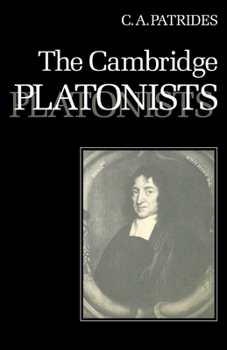The Cambridge Platonists
This volume contains the selected discourses of four seventeenth-century philosophers, carefully chosen to illustrate the tenets characteristic of the influential movement known as Cambridge Platonism. Fundamental to their beliefs is the statement most clearly voiced by Benjamin Whichcote, their leader by common consent, that the spiritual is not opposed to the rational, nor Grace to nature. Religion is based on reason, even in the presence of 'mystery'. Free will and Grace are not mutually exclusive. The editor's comprehensive introduction delineates the main principles of the Cambridge Platonists, in the light of their heritage. It compares their attitude to contemporary thought, stressing their mistrust both of institutionalised religion and of the rising tide of materialism. The sermons are reprinted from the original texts and fully annotated with comparisons and references to a wide range of works. The editor also includes a useful list for further reading, biographical notes and a comprehensive index.
Format:Paperback
Language:English
ISBN:0713154608
ISBN13:9780521299428
Release Date:August 2008
Publisher:Cambridge University Press
Length:376 Pages
Weight:1.15 lbs.
Dimensions:0.8" x 5.5" x 8.5"
Customer Reviews
1 rating
Absolutely lucid!
Published by Thriftbooks.com User , 19 years ago
[...] If you are curious about the Cambridge Patonists, Patrides carefully edited selection of texts gives you the cream of the crop! - Benjamin Whichcote, Ralph Cudworth, John Smith, Henry More et al. - material reprinted from the original texts, complete with all the archaic but fascinating English spellings. The texts are fully annotated with comparisons and references to a wide range of cognate works. If you are reading the Cambridge Platonists as part of an academic exercise or are otherwise familiar with their milieu, well and good. You will know what to expect. I think it is worth saying something here - for the general reader. I am sufficiently 'unmodern' (or perhaps 'un-postmodernist') to read the Cambridge Platonists because I think they still have something valuable to say! Not everyone would agree with me - but, I think the portrait of Benjamin Whichcote which graces the cover of this book (and the frontispiece) says something about the sort of men we are dealing with. (The portrait still hangs in the gallery at Emmanuel College, Cambridge). There is composure in that expression. It seems to infuse the whole being of the man. It is the expression of a mind which has found calm waters, seen eternal verities. One of the papers in this book - Ralph Cudworth's, was preached as a Sermon Before the House of Commons (i.e. the British Parliament). Things are different with us today. We are no longer certain of eternal verities. It seems almost incomprehensible - now, to think that when the Cambridge Platonists were expounding their ideas in the 17th c., they were touching on matters of concern to most thinking people. Religion and science had not yet parted company (despite being called a 'father of modern science' in school books, Issac Newton was a deeply religious man, very much in tune with the ideas of the Cambridge Platonists). The great beauty of the Cambridge Platonists, is their calm confidence, their utter conviction that there are eternal verities, that Reason and Faith are complementary faculties. Thus, on the one hand, they looked back to the philosophers of antiquity (strictly speaking, they are Neo-Platonists, taking in everything between Plato, Plotinus, Ficino/Renaissance thought, even Hermeticism) - and the legacy of Christianity, while on the other hand - they were alive to the emerging 'scientific' spirit, the renewed quest to understand the principles ordering the phenomenal universe. For them, there was an Intelligent - and intelligible order in the universe. For them, Reason (capital R) still had its pre-Kantian, classical sweep. 'Reason' was not a mere idea in the head, an itching in the cranium, but presupposed the divine Nous (intellect), intimately connected with the activity of a divine energy (energeia)informing the pattern of the universe. We find them preaching against false religious 'enthusiasm' - as soundly as they preached against atheism. "Good men spiritualise their bodies; bad me





